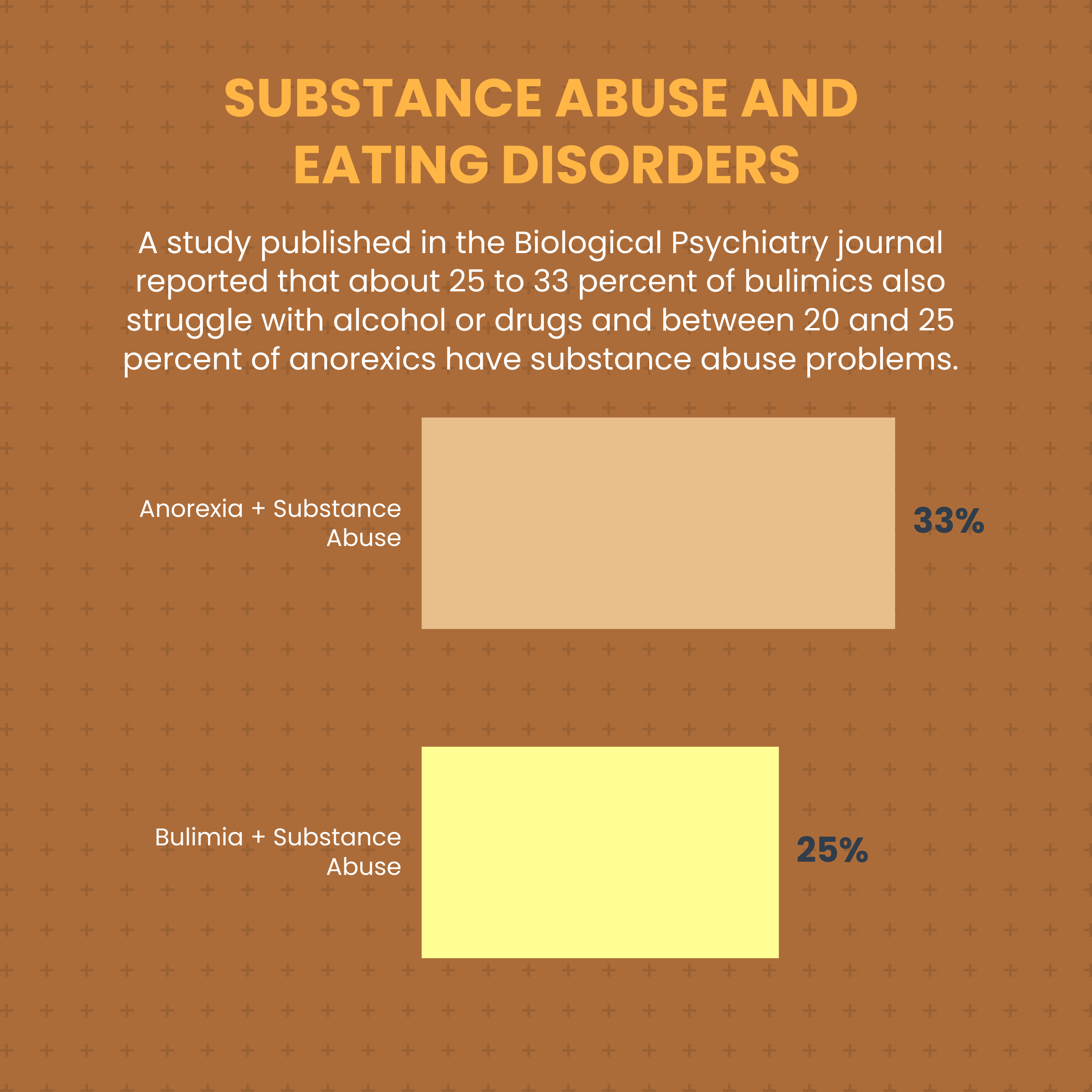Pictured Above: Data from the Biological Psychiatry journal showed the percentage of anorexic and bulimic people who also have substance abuse problems.
Sophie Ojdanic | The Crow’s Nest
By Edyn Gottlieb
For many, college is the first place they experience drinking. A sudden introduction to alcohol can be difficult to navigate for some who are entering a novel social environment.
The role that drinking plays in college’s social culture can lead some to develop an unhealthy relationship with alcohol. Diet culture is rampant in colleges and, when paired with dangerous drinking habits, can lead to a disorder unofficially called “drunkorexia.”
Drunkorexia is not a clinical term, but it is commonly used to describe someone who experiences a combination of alcohol use disorder and disordered eating behaviors.
The term was first defined by New York Times journalist Sarah Kershaw in the 2008 article Starving Themselves, Cocktail in Hand.
“Drunkorexics are college-age binge drinkers, typically women, who starve all day to offset the calories in the alcohol they consume,” Kershaw wrote.
Even though the term doesn’t appear in the Diagnostic and Statistical Manual for Mental Disorders (DSM), it is widely recognized by many mental healthcare providers and the eating disorder community according to the Center for Discovery.
“There’s no clear definition of what ‘drunkorexia’ is in the research literature,” Miriam Eisenberg Colman, a scientist at the Fors Marsh Group said in an interview with Healthline. “But I would call it a restriction of food, carbohydrates or calories prior to consuming alcohol.”
Drunkorexia’s onset isn’t always immediate. Not eating before going out to “conserve calories” can quickly turn from a “bad habit” or “college culture” to a dangerous, potentially life threatening, eating and alcohol abuse disorder.
According to American Addiction Centers, excessive drinking has been linked to increased risk of poor academic performance, criminal behavior and unsafe sexual habits.
The National Institute on Alcohol Abuse and Alcoholism reported that 1,800 college students die annually from alcohol-related accidents.
Nearly 700,000 students are assaulted by a peer who has been drinking.
Drinking on an empty stomach raises your blood alcohol content at a faster rate and significantly increases the risk of experiencing strong negative effects.
The booze-based college culture and social pressures makes college students extremely vulnerable to behaviors recognized as drunkorexia.
According to studies from the National Library of Medicine, up to a third of college students say they reduce the amount of food they eat before drinking in order to compensate for the calories in alcohol.
“Both disorders are behaviors that are glorified and reinforced,” Dr. Douglas Bunnell, past president of the National Eating Disorders Association, said in an interview with the New York Times. “Binge drinking is almost cool and hip and losing weight and being thin is a cultural imperative for young women in America. Mixing both is not surprising, and it has reached a tipping point in terms of public awareness.”
According to Kershaw’s article, studies show that binge drinking and alcohol abuse are on the rise, particularly among young women.
A study published in the Biological Psychiatry journal reported that about 25 to 33 percent of bulimics also struggle with alcohol or drugs and between 20 and 25 percent of anorexics have substance abuse problems.
If a person isn’t consuming enough calories before ingesting alcohol they are at high risk for dehydration, vitamin deficiencies, alcohol poisoning, hypoglycemia and alcohol-related brain damage.
If the drunkorexic behaviors go untreated, the long-term side effects can include liver disease, osteoporosis, diabetes, dementia and cardiac problems according to the Center for Discovery.
These serious, potentially life threatening side effects are a big reason why early identification of drunkorexic behaviors is so important.
Because of this, it’s crucial that resources are available through universities to educate students about safe drinking habits and to help those who may be struggling receive the treatment they need.



